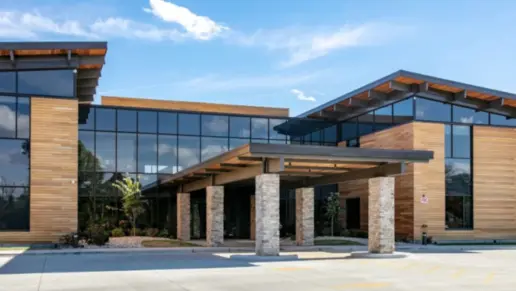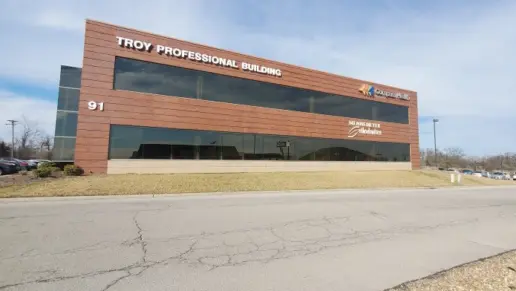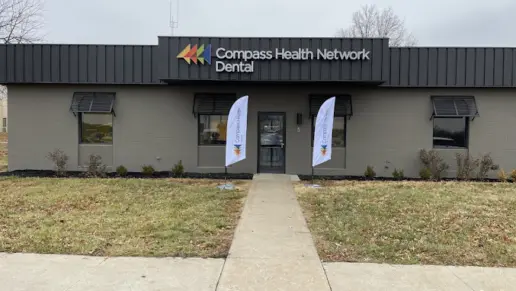About Heartland Center for Behavioral Change
Adults in Liberty, Missouri who need alcohol and drug rehab services can receive support through the Heartland Center for Behavioral Change. They have been in operation for 40 years and provide an array of services to help clients break free from addiction. You can get medical detox, residential treatment, and outpatient care. They also have medication assisted treatment, which is called MAT. They offer most services at a low cost or no cost based on a sliding fee schedule.
The medical detoxification program helps clients withdraw from addictive substances so they can be as healthy as possible when they enter the next phase of recovery. The program includes medical treatment of symptoms. For those who use opioids or alcohol, MAT can allow them to stay on medication to manage cravings and avoid relapse during treatment.
After detox, outpatient treatment is available. One of the most interesting features of this rehab is that there is no cap on how long this program should last. Instead of requiring clients to complete their plan within a pre-determined timeframe, the team allows them to work at their own pace as they complete their custom treatment plan. They believe that recovery is a personal journey that can’t be rushed. They offer different degrees of outpatient treatment that vary from daily services to monthly support. Some of the available services include group-based and individual counseling sessions, peer based support groups, recovery-focused education, and medication management.
They encourage family members to take an active role in their loved one’s recovery, They also provide referrals and connections to community services so clients can continue participating in counseling, support groups, and other recovery resources once they leave the program.
Clients note that the atmosphere at the facility is organized and respectful. They have received four consecutive CARF accreditations, which speaks to their commitment to quality care.
Facility Overview
Rehab Score
Other Forms of Payment
Self-pay involves paying for treatment out of your own pocket. You can use savings or credit, get a personal loan, or receive help from family and friends to fund your treatment. If you don't have insurance or your insurance plan doesn't cover a specific program, self-pay can help ensure you still get the care you need.
Medicaid is a state based program that helps lower-income individuals and families pay for healthcare. Medicaid covers addiction treatment so those enrolled can use their coverage to pay for rehab. When a program accepts Medicaid the client often pays very little or nothing out of their own pocket.
Financial aid can take many forms. Centers may have grants or scholarships available to clients who meet eligibility requirements. Programs that receive SAMHSA grants may have financial aid available for those who need treatment as well. Grants and scholarships can help you pai for treatment without having to repay.
Sliding scale payments are based on a client's income and family size. The goal is to make treatment affordable to everyone. By taking these factors into account, addiction recovery care providers help ensure that your treatment does not become a financial burden to you or your family, eliminating one barrier to care.
Addiction Treatments
Levels of Care
Treatments
The goal of treatment for alcoholism is abstinence. Those with poor social support, poor motivation, or psychiatric disorders tend to relapse within a few years of treatment. For these people, success is measured by longer periods of abstinence, reduced use of alcohol, better health, and improved social functioning. Recovery and Maintenance are usually based on 12 step programs and AA meetings.
Drug rehab in Missouri usually involves several phases: detox, rehab, and aftercare. The rehab phase may include a combination of inpatient and outpatient treatments, as the individual moves through a continuum of care on their recovery journey.
Opioid rehabs specialize in supporting those recovering from opioid addiction. They treat those suffering from addiction to illegal opioids like heroin, as well as prescription drugs like oxycodone. These centers typically combine both physical as well as mental and emotional support to help stop addiction. Physical support often includes medical detox and subsequent medical support (including medication), and mental support includes in-depth therapy to address the underlying causes of addiction.
Substance rehabs focus on helping individuals recover from substance abuse, including alcohol and drug addiction (both illegal and prescription drugs). They often include the opportunity to engage in both individual as well as group therapy.
Programs


Clinical Services
Research clearly demonstrates that recovery is far more successful and sustainable when loved ones like family members participate in rehab and substance abuse treatment. Genetic factors may be at play when it comes to drug and alcohol addiction, as well as mental health issues. Family dynamics often play a critical role in addiction triggers, and if properly educated, family members can be a strong source of support when it comes to rehabilitation.
Group therapy is any therapeutic work that happens in a group (not one-on-one). There are a number of different group therapy modalities, including support groups, experiential therapy, psycho-education, and more. Group therapy involves treatment as well as processing interaction between group members.
In individual therapy, a patient meets one-on-one with a trained psychologist or counselor. Therapy is a pivotal part of effective substance abuse treatment, as it often covers root causes of addiction, including challenges faced by the patient in their social, family, and work/school life.
Staff & Accreditations
Staff

President & CEO

Board Chair

VP Behavioral Health Services

Casey Spartz

Director of Finance
Accreditations

The Commission on Accreditation of Rehabilitation Facilities (CARF) is a non-profit organization that specifically accredits rehab organizations. Founded in 1966, CARF's, mission is to help service providers like rehab facilities maintain high standards of care.
CARF Accreditation: Yes
Contact Information
1205 College
Liberty, MO 64068


